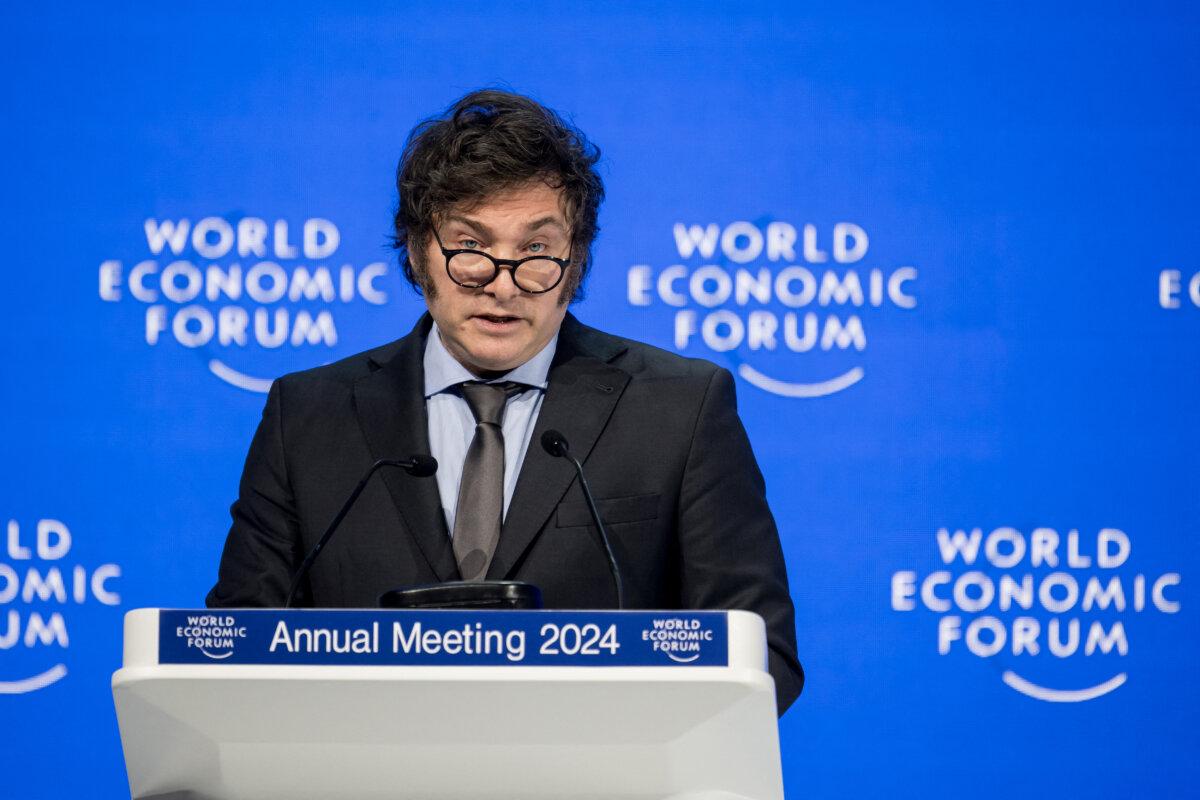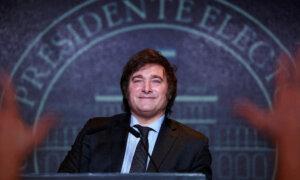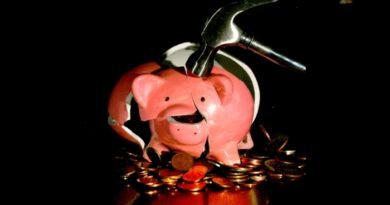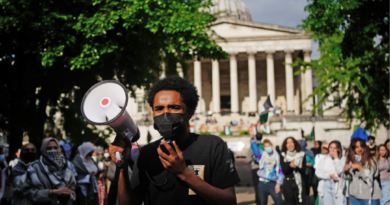Argentina Experiences Strong Peso Recovery During Javier Milei’s Leadership
Argentina’s president has achieved the country’s first fiscal surplus since 2008 amidst sweeping reforms.
Just four months into his term, Argentina’s President Javier Milei has stabilized the national currency and achieved the country’s first fiscal surplus in 16 years for the first quarter.
The Argentine peso, previously facing a rapid decline, has seen a substantial recovery. In the last three months, the black market exchange rate of the peso against the U.S. dollar has increased by approximately 25 percent. This rise has exceeded that of all other currencies tracked against the dollar by Western financial institutions.
In Argentina, due to restrictions on acquiring U.S. dollars through official channels, the black market exchange rate—also referred to as the parallel rate, Dollar Blue, or Blue-Chip Swap (BCS)—is a crucial alternative. This rate, driven purely by market forces, is widely utilized by investors.
The past decade saw the peso’s value plummet. In 2012, one dollar was equivalent to 4.2 pesos. By last May, when the Central Bank of Argentina introduced a new 2000-peso note, it was only worth four U.S. dollars.
Following President Milei’s inauguration, the parallel rate spiked to 1250 pesos but dropped below 1000 pesos twice after Milei implemented comprehensive reforms, once in early March and again in mid-April.
The rate has since experienced a slight rebound.
The peso’s stronger performance has enabled the Central Bank of Argentina to actively purchase U.S. dollars, bolstering its hard currency reserves. Reports from early April indicate that since President Milei’s administration began, the bank has acquired $12.1 billion, raising its international reserves to $28.3 billion.
The growing confidence in the peso among Argentinians has also reduced the demand for U.S. dollars. On April 25, the Central Bank lowered the annual benchmark interest rate from 70 percent to 60 percent, marking the fourth reduction since Milei assumed office.
First Fiscal Surplus in Argentina Since 2008, Amidst Sweeping Reforms
On April 22, in a televised address, President Milei declared a notable fiscal surplus of over 275 billion pesos (approximately $309 million at the official exchange rate) for the first quarter of the year, equivalent to 0.2 percent of the GDP. This achievement marks Argentina’s first quarterly fiscal surplus since 2008.
The libertarian president emphasized that maintaining fiscal discipline—ensuring government expenditures do not exceed income and avoiding currency issuance—would prevent inflation. “It’s not magic,” he stated, assuring Argentinians that recent sacrifices would lead to lower taxes in the future.
Since his inauguration on Dec. 10, President Milei committed to stringent fiscal austerity. His administration has halved eighteen government departments, devalued the official exchange rate by over 50 percent, eliminated numerous price control measures, significantly reduced subsidies for energy and transportation, and suspended various public works projects.
These measures, referred to as “shock therapy,” have led to a decrease in Argentina’s monthly inflation rate from a thirty-year high recorded last December.
Challenges, Protests
While President Milei’s reforms have garnered praise, their sustainability and the public’s tolerance for the associated hardships remain uncertain. The reduction in spending has addressed severe fiscal deficits but has also adversely affected many citizens, immediately impacting their interests.
This discontent was palpable on April 23 when hundreds of thousands of Argentinians protested in Buenos Aires, the country’s capital, against the budget cuts to public universities, the most significant protest against the government’s austerity measures so far. Public universities in Argentina, heavily dependent on government support, provide free undergraduate education.
Significant reductions in funding for numerous state-owned enterprises have sparked substantial conflict between the government and both employees and powerful unions. President Milei’s proposal to privatize these enterprises has also faced significant challenges in Congress.

Highlighting his growing international profile, TIME magazine named President Milei as one of the 100 most influential leaders of 2024 on April 17. TIME noted that it’s too early to fully assess the success of his policies, but it’s clear that under President Milei’s leadership, Argentina is charting a definitive course forward.
‘Socialism Is the Root Cause of Poverty’
Argentina’s economic trajectory is one of the most extensively analyzed globally. In 1971, Nobel Laureate in Economics, Simon Kuznets, identified four distinct economic categories: developed countries, developing countries, Japan, and Argentina.
The latter two represent starkly different outcomes; Japan, despite its lack of natural resources, embraced democracy and the principles of freedom and human rights post-World War II, propelling itself into the ranks of the world’s developed nations through remarkable economic growth. Conversely, Argentina, despite its abundant fertile lands and initial economic prosperity, witnessed a dramatic reversal from being one of the top ten wealthiest nations to a state of poverty.
In the early 20th century, Argentina’s population, total income, and per capita income exceeded those of Canada and Australia. By 1913, it was among the wealthiest nations per capita.
The course of Argentina’s economy took a significant turn in 1946 with the presidency of Juan Perón, who introduced a state-led planned economic model known as “Peronism.”
Then-President Perón criticized the export-oriented agricultural model involving foreign capital as “inhumane economics seeking private profit.”
He shifted focus toward redistributing wealth domestically, nationalizing key economic infrastructure and industries previously held by foreign investors.
This shift toward economic policies that overlooked operational efficiency led to stagnation in economic growth. The government faced escalating fiscal deficits, dwindling foreign exchange reserves, and a steep decline in the value of the Argentine peso. These economic challenges culminated in Perón’s ousting through a military coup in 1955, forcing him into exile in Spain.
Milei Condemns Collectivism, Links It to Communism
In recent decades, Argentina has swung between support for “Peronism” and “anti-Peronism,” with over 40 percent of its population living in poverty and annual inflation rates soaring above 200 percent as of last year.
President Milei was born into a common family with virtually no political experience, earning him the nickname “the Trump of Argentina.” President Milei champions economic liberalism and advocates for a small government.
Although some label him as far-right, he identifies more specifically as a libertarian and an anarcho-capitalist.

Anarcho-capitalism, the ideology supported by President Milei, advocates for the elimination of the state as an economic player, the abolition of taxation, the promotion of free markets and private property rights, and the combatting of fraud.
President Milei has consistently argued that socialism and collectivism are at the root of poverty.
During a passionate address at the Davos World Economic Forum in Switzerland on Jan. 17, he criticized collectivist policies, stating, “We’re here to tell you that collectivist experiments are never the solution to the problems that afflict the citizens of the world. Rather, they are the root cause. Do believe me: no one is in [a] better place than us, Argentines, to testify to [this].”
He argued that Argentinians are uniquely positioned to attest to this, having experienced a century of collectivism that led to widespread systemic poverty. He explicitly linked communism, socialism, and fascism as variants of the destructive collectivist approach.
President Milei also asserted that “free trade capitalism” is not a source of global issues but rather the sole mechanism capable of eradicating global hunger, poverty, and extreme poverty.





